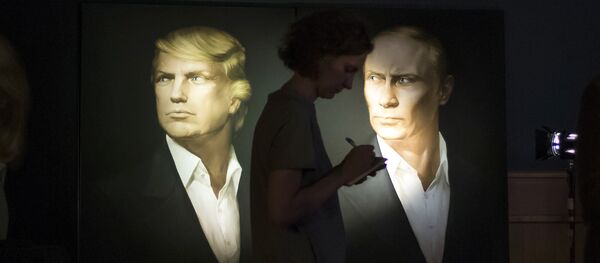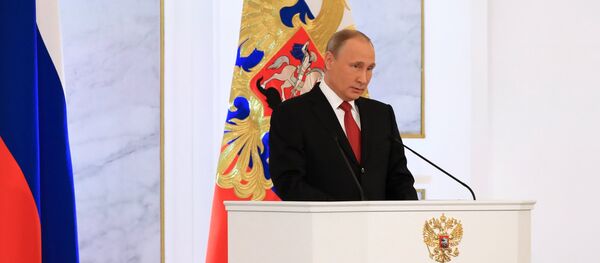WASHINGTON (Sputnik) — The return of US companies to working in Russia depends on the political will of US president-elect Donald Trump's incoming administration, Russia's trade representative to the United States Alexander Stadnik told Sputnik.
"Regarding those sectors shut for US companies by the United States itself, everything will depend on the political will of the new US administration. We still continue to preserve our openness, we have preserved it despite unfriendly actions and pressure from sanctions, we understood that openness will bring the return of our dialogue into a civilized direction closer," Stadnik said.
US anti-Russian sanctions, imposed after Crimea rejoined Russia and the Ukrainian crisis broke out, forbid US companies from dealing with sanctioned individuals and entities under their control.
The future US administration's policies on Russia depend on its composition and Trump's team is still being formed, the trade representative said adding that there is a chance to improve the bilateral ties.
"It is necessary to understand what sort of team will be formed by the new leader and what his program will be regarding Russia. There is a chance to improve cooperation between our countries, there needs to be a transition from statements to correct pragmatic actions," he said.
US Companies Interested in Russia Despite Media Fearmongering
US companies continue to be greatly interested in working with Russia despite the pre-election anti-Russian media storm in the United States, Russia's trade representative to the US told Sputnik.
"US business appetite for Russia is great. It is now receiving an additional impulse. The state of civil society is fueling the demand. The propaganda and the pre-election fearmongering stories which were told by television channels about Russia and its long-reaching grasp, about its influence on US elections, did not work," Stadnik said.
People in the United States are feeling fresh prospects regarding Russia after Trump's pre-election promises to establish good relations with Russia, he added, noting that Russia is expecting relations based on trust and the respect of mutual interests.
Sanctions Barred US Firms From Chance to Invest in Russian Energy, High Tech
Sanctions on Russia led to US firms missing out on opportunities to invest in Russia’s energy, finance and high tech industries, the trade representative said.
"The most vivid examples of missed opportunities were in the energy, financial sectors and microelectronics, which could be deemed double-use products," Stadnik said.
Simultaneously, the drop in the Russian national currency’s value against the dollar in the past years increased US-Russia trade flows, he added.
"The trade turnover is now at 10 percent, and we can still see another uptick by the end of the year. Last year the figure was around $21 billion," Stadnik said.
In 2014, the United States along with the European Union and some other countries imposed several rounds of sanctions against Russia over its involvement in the Ukrainian crisis, a claim which Moscow has repeatedly denied.
US-Russia Pre-Sanction Trade Level Hard to Reach
It will take considerable effort to bring US-Russia trade back to the level it was at before Washington imposed sanctions on Moscow, the Russian trade representative to the United States told Sputnik.
"A return to the starting point will be really, really difficult to make," Stadnik said. "Investment flows and market niches have changed. Long-term opportunities have been snatched up by businesses in the countries where policy-makers and administrations opted for closer business ties with Russia, instead of sanctions."
The envoy said companies from Latin America, the Middle East, North Africa, Southeast Asia, and most notably China had capitalized on business opportunities in Russia, and predicted that US President-elect Donald Trump would face fierce resistance from the Congress if he tried now to scrap US economic sanctions on Russia to bring US business back to Russia.
"I feel that this is of merely emblematic nature on one side. On the other side, this is a rather serious signal for us that Trump has opponents among his fellow party members which make up the majority in Congress," he said.
Stadnik described the proposal to impose new sanctions on Moscow as "an angry child tweaks" which could prompt "a grown up response."
The envoy added European countries would be equally at disadvantage if they tried to come back to the Russian market after upholding US-initiated economic restrictions on Russia.
"They saw other countries – Serbia, Turkey, Israel, Latin American nations – increase exports of agricultural products to Russia. They had to give up these niches and a comeback wouldn't be easy," Stadnik said.
US Investments in Russia Continue Despite Economic Sanctions
Leading companies from the United States continue to invest in the emerging Russian market despite economic sanctions and international tension, Alexander Stadnik told Sputnik.
"I am impressed by how American businesses reacted to the frequent reminders about sanctions," Stadnik stated. "US companies have been seeking our ideas, support and possible collaboration. After all, business should determine what we ought to do in order to successfully complete projects."
Stadnik pointed out that during meetings with leading US companies, Russian officials have been focusing on informing potential business partners about economic progress in the country instead of any potential barriers.
"We can be proud of our accomplishments in the sector," Stadnik stressed. "For instance big retailers, like Sweden's IKEA and France’s Leroy Merlin are putting $1.6 billion and $2 billion, respectively, in new stores in Russia."
Stadnik concluded that more US companies should also consider expanding production in Russia given the great potential to achieve high profits for investors.
Foreign direct investment in Russia rose to $8.3 billion in the first nine months of 2016, which vastly exceeds the 2015 total of $5.9 billion, according to Central Bank data.
Russia Unlikely to Start Rapid US Bond Selloff, Move Not Beneficial
Russia is unlikely to sell the US bonds rapidly to avoid global depreciation, the move is not beneficial for anyone, Stadnik told Sputnik.
"It is unlikely that this [bond selloff] will happen rapidly, this is not beneficial to anyone, rapid selloff may negatively affect the value of assets worldwide. Do not forget that gold reserves are stored in the US securities. These are highly reliable and highly liquid securities, which, moreover, bringing us an additional interest. The central bank uses these funds for the exchange operations. These are not budgetary funds that could be spent in Russia," Stadnik said.
In September, Russia sold the US bonds worth $11 billion, some 10 percent of the total it has.
Russia’s Exports to US Increase by 9.6 Percent in 2016
Exports from Russia to the United States have grown by more than nine percent this year and there is a big potential for further growth, Russia’s trade representative to the United States told Sputnik.
"If we look at the physical volumes, which reflect the actual sales, the Russian exports grew by 9.6 percent in 2016," Stadnik said. "This figure, in addition to last year’s 25 percent increase, demonstrates the demand for Russian products on the American market, and strong Russian exporters’ position. And the growth potential is still far from being exhausted in the US market."
Stadnik stressed that the United States remains a major market for Russia, it is a top ten market for Russian exports, and ranks third among Russia’s largest importers.
While the exports of goods continued to grow, in monetary terms, the Russian-American trade turnover has reduced by 9.6 percent in 2016, and amounted to $14.3 billion from January-September due to the low oil prices.
"Russian exports decreased by $6.6 billion or 8.7 percent, and imports decreased by $7.8 billion or 10.3 percent," he explained. "These figures do not reflect the real situation, however. The fact is that after oil prices dropped, the prices for other export goods from Russia, including metals, chemicals, and fertilizers fell as well. On some products prices have fallen by 2-3 times."
Russian Trade Mission Hopes to Resume Presidential Commission Under Trump
"I hope that we are getting to the point when we can turn the page. During the phone conversation Russian President Vladimir Putin and US President-elect Donald Trump gave an adequate assessment of the state of our relations, saying that it should be changed," Stadnik said. "And the basis should be the trade-economic component. I hope that the new administration will work in this direction."
"I think it is necessary to move towards a full resumption of the mechanisms of bilateral cooperation at the intergovernmental level, first of all, of the US-Russian Presidential Commission and its working groups, including on trade and economic issues," he added. "These are the most effective mechanisms."
Stadnik noted that the new President will be unable to lift all sanctions by his orders.
"He will have to overcome a very serious resistance in Congress, if it can be overcome at all. Some of the sanctions that were imposed in 2014-2016 can have a long history," he added.
The US-Russia Bilateral Presidential Commission was created in 2009 to chart a fresh start in relations between the two countries. The Commission was dedicated to identifying areas of cooperation and to pursue joint projects and actions that would strengthen strategic stability, international security, and economic well-being.
The United States has suspended bilateral efforts across the US-Russia Presidential Commission amid worsening relations between the two countries.




